Long Run: the electrifying star in a golden age of chasing
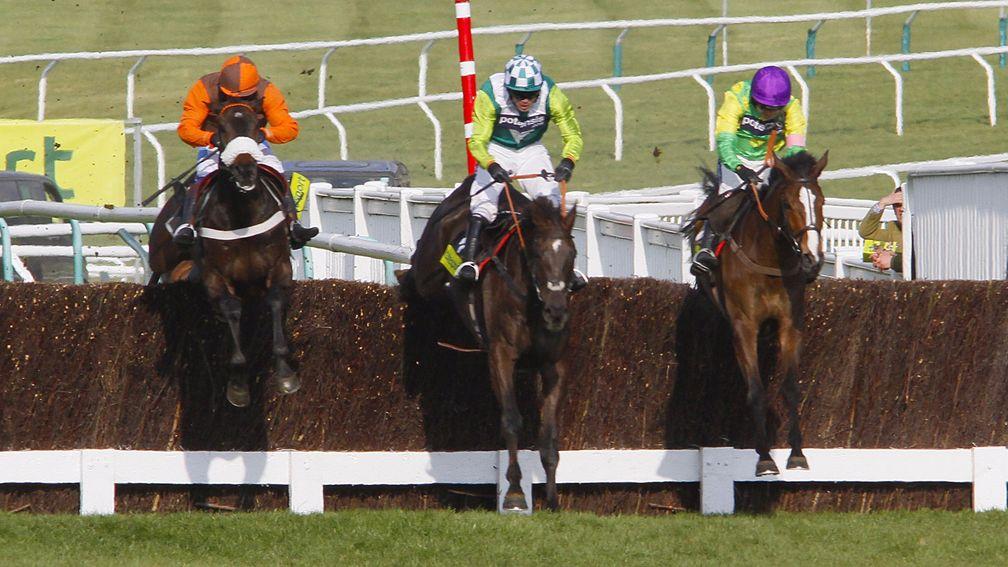
Nicky Henderson's French-bred mare Liberthine had a fantastic racing career. Among the six wins from her 25 starts in the mid-2000s were the Topham Chase at Aintree and the Mildmay of Flete Handicap Chase (now the Brown Advisory Plate) at the Cheltenham Festival, successes that helped to launch the high-level career of amateur jockey Sam Waley-Cohen.
Her lasting legacy, though, may be in helping to introduce the world to her younger half-brother. Without Liberthine, the story of Cheltenham Gold Cup hero Long Run could have transpired very differently.
When Liberthine’s owner, Robert Waley-Cohen, father of Sam, got wind that her sibling was making a splash in France, he thought it prudent to have a look for himself.
“We had a lot of fun with Liberthine and Dad had said her brother was going to run at Auteuil and we should have a look,” says Waley-Cohen jnr. “We went into the paddock and thought ‘wow, that’s as handsome a horse as you’ll ever see.’ And that was Long Run.
“He looked so special and given we’d had such fun with Liberthine we thought we’d have a go and see if it was possible to buy him. He was already a talented horse over there with a good track record and it didn’t take a genius to work out we might have a superstar.”
Few horse-and-jockey combinations have been as intrinsically linked as Sam Waley-Cohen and Long Run would become. This was the horse that took the young rider to heights an amateur dare not even dream of, surfing a wave of success in a magnificent career that saw Long Run notch five Grade 1 triumphs.
Those included a Feltham Novices’ Chase on his British debut, two King George VI Chases and the jewel in the crown, a Cheltenham Gold Cup victory over Denman and Kauto Star in 2011. His 15 wins from 34 starts helped to amass prize-money in excess of £1.5m and included a sequence of 26 consecutive top-three finishes.
For Waley-Cohen, it was a life-changing journey. “Racing was always meant to be a hobby and a bit of low-key fun for me, so it was a total blessing to have a horse who provided me with such incredible days and memories,” says the amateur, who in his working life is chief executive of a large dental care group.
“It changed the sport from a bit of fun to a high-octane, high-pressure, high-ambition activity, which has been fantastic, and I couldn’t have imagined having more fun with it.
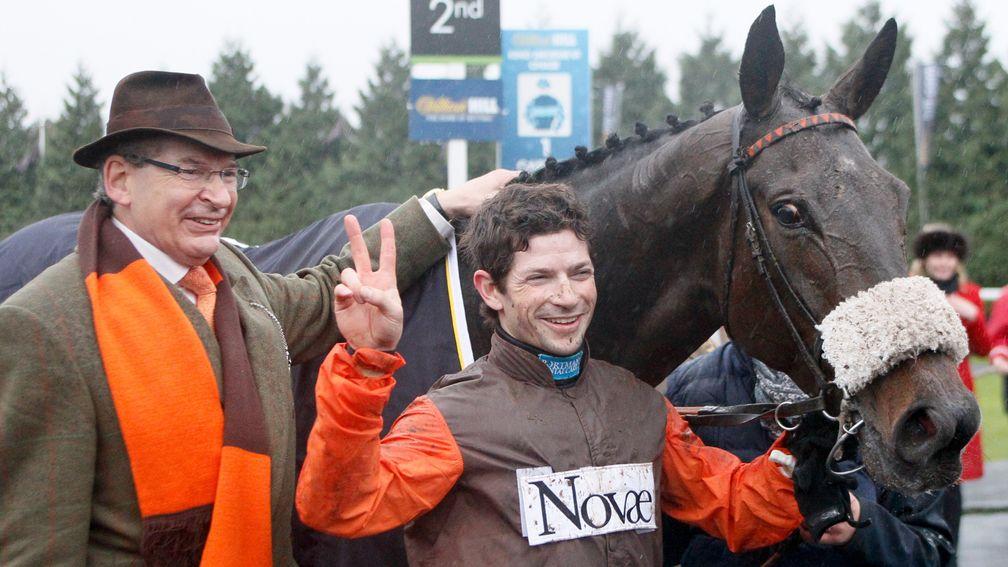
“To take an amateur to three Gold Cups in three years, winning one and getting top three in the other two was amazing – and to have two wins and a second in the King George. Long Run had an amazing resilience to perform to that level year after year.”
The relationship did not have the easiest of beginnings. After purchasing Long Run in the autumn of 2008, the Waley-Cohens left him to continue his racing education under Guillaume Macaire in France for the next year.
After Long Run had a run of four consecutive victories, including at Grade 1, 2 and 3 level, Waley-Cohen travelled over to sit on the burgeoning talent for the first time in the Grade 3 Prix de Pepinvast hurdle at Auteuil in April 2009.
“I remember it being a really weird race,” Waley-Cohen recalls. “They went really slow and then it turned into a sprint. I remember asking Guillaume in the paddock for my instructions and all he said was I’d be riding a genius. I don’t know this track, I don’t know this horse and those are your instructions!
“Riding in France at Auteuil is a very different experience to riding in Britain. He got beaten, which hadn’t happened often in France, and you’re left wondering what you could have done differently.”
The pair finished third, the only time Long Run failed to finish in the top two in 12 starts in his native land. But that did nothing to dampen the excitement around the son of Cadoudal and before long he was travelling across the English Channel and into the care of his big sister’s trainer, Henderson.
“Nicky is a genius at handling horses like that,” says Waley-Cohen. “He's a wise old boy who has seen plenty of good horses that haven’t lived up to their potential, but the thing with him is that he’s always excited about something new. There was a real expectation there right from the first day.”
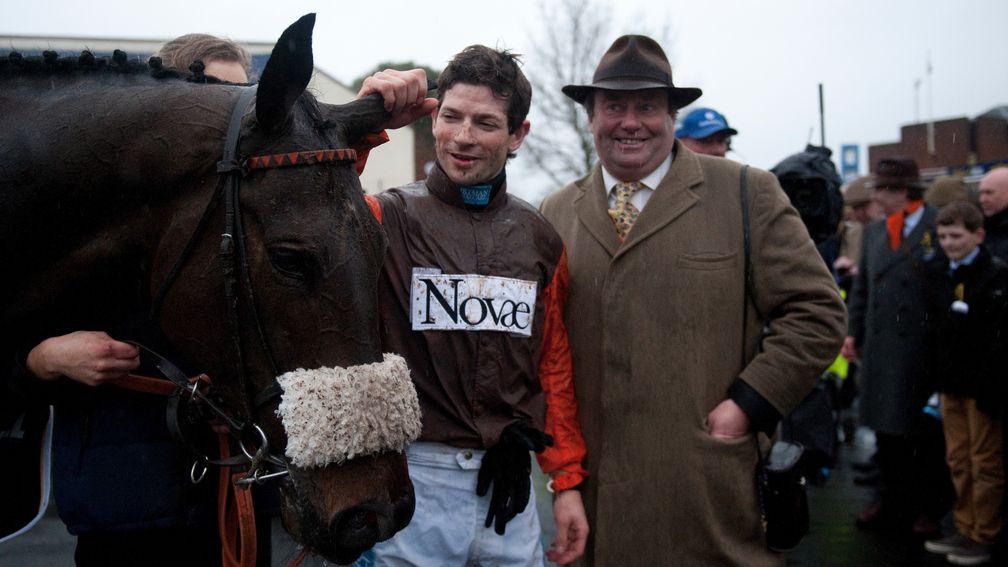
That word, ‘expectation’, punctuates the conversation with Waley-Cohen. It is clear he felt the pressure of being an amateur rider responsible for steering one of the most talented jumps horses, and there were dissenters who thought the ride was beyond him. Not that the Waley-Cohens took much notice.
“Dad was always adamant that we’d bought this horse to do this together. I never really got into Twitter or the blogosphere, so I was probably quite ignorant of any of that commentary. It’s not productive.”
Long Run could provide Waley-Cohen with enough headaches all on his own. Never the sort of horse to relax on and enjoy the scenery, he had quirks that would have tested the skill of any jockey.
“He was a really difficult ride in that he didn’t respect his fences and he could tend to be quite keen,” Waley-Cohen explains. “He was competitive to the point of no return. If a car was driving next to him on the gallop, he’d be trying to take it on.
“He was like that in a race, just trying to get to the front the whole time. He never made your life easy. He didn’t work it out for you and you had to take some chances.”
The pressure was never greater than in the lead-up to the 2011 Cheltenham Gold Cup, by which time he was already in top echelon at the age of six.
After bursting on to the British scene in the 2009 Feltham Novices’ Chase, a swift reality check followed with a below-par run in the RSA Chase at the Cheltenham Festival. A third-placed finish left connections wondering whether he truly could cut it at the highest level.
He extinguished those concerns in spectacular fashion in his second British campaign. A season-opening third in the Paddy Power Gold Cup over a trip that was shorter than ideal set him up for a crack at the King George VI Chase at Kempton and a first meeting with Kauto Star, seemingly impregnable in the traditional Boxing Day highlight.
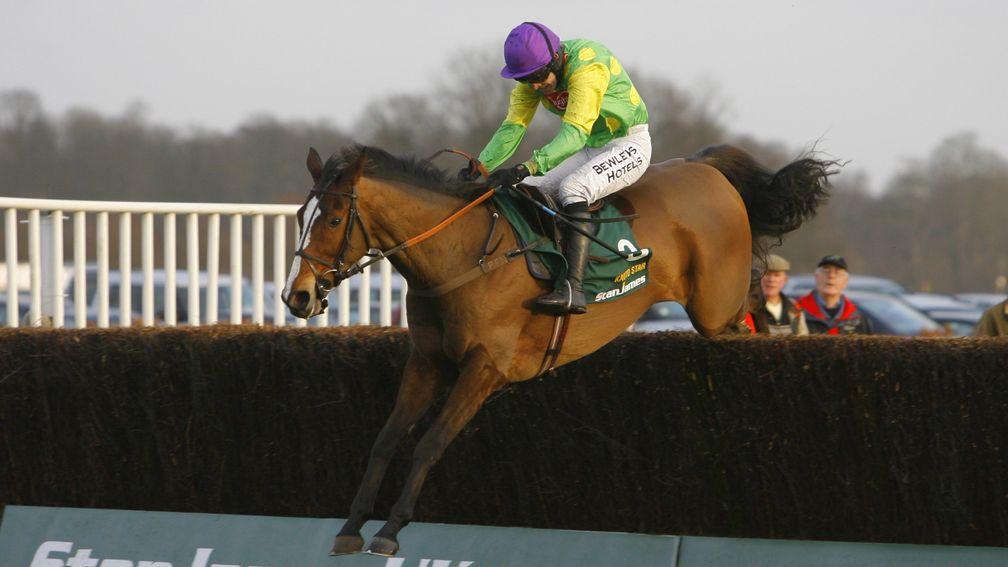
After snow had delayed the running of the race until January 15, the Waley-Cohens’ newly turned six-year-old emphatically stated his credentials.
Waley-Cohen jnr recalls the day, saying: “We were so excited and it was a great renewal. There is so much expectation and you just hope the horse performs up to his level, especially as an amateur. To be riding on the biggest stage against the biggest horses, riders and trainers, it can be hard to get your head around.”
As was now becoming customary, Long Run did not have the smoothest of passages through the race, blundering at a couple of fences and regularly having to be urged along by his ever-willing partner. The end result, though, was a spectacular 12-length thrashing of Riverside Theatre, with odds-on favourite Kauto Star a further seven lengths away in third.
“The way he won made us think ‘what could he be?’ That was the moment when we realised he was something very special, and he was doing it at such a young age as well.”
Had the race taken place on its intended date, Long Run would have become only the second five-year-old to win in the race’s 83-year history.
There followed an excruciating countdown to his day of destiny at Cheltenham in perhaps the most intimidating Gold Cup field of all time featuring the winners of each of the previous four runnings: Imperial Commander, Denman and dual champion Kauto Star.
Maddy Playle: the veterans' series is a monumental success – and it is vital is stays as it is
Recalling his approach in the preceding weeks, Waley-Cohen says: “When you’ve got a horse like Long Run, the horse of a lifetime, you’re fully focused on getting him and yourself there fully fit and ready. Schooling him in front of the full Seven Barrows string with all the top professionals there is as daunting as it can get. That set me up for the pressure going into the big day.
“I just tried to approach it as if it was any other race. Like it was just a three mile point-to-point. Because the RSA hadn’t gone to plan the year before, that helped me manage my own expectations and not put them too sky high.”
On the day itself, Waley-Cohen entered his own world as the off time approached, unaware that his mount was being backed into favouritism ahead of his illustrious rivals. In a spine-tingling renewal, Long Run eyeballed each of these giants of jump racing and left them to eat his dust up the famous hill, pounding the great Denman by seven lengths.
Aged six, he became the youngest Gold Cup winner since Mill House in 1963.
The way Waley-Cohen recounts how the race unfolded, it is as if it could have taken place half an hour ago. It is a tale you feel he will never tire of telling.
“At a couple of fences I remember thinking ‘we can’t be making mistakes like this and get away with it’,” he says. “He wasn’t helping me at all. I had to keep asking for longer and longer strides and when you do that you know you’re risking pushing him just that little bit too much.
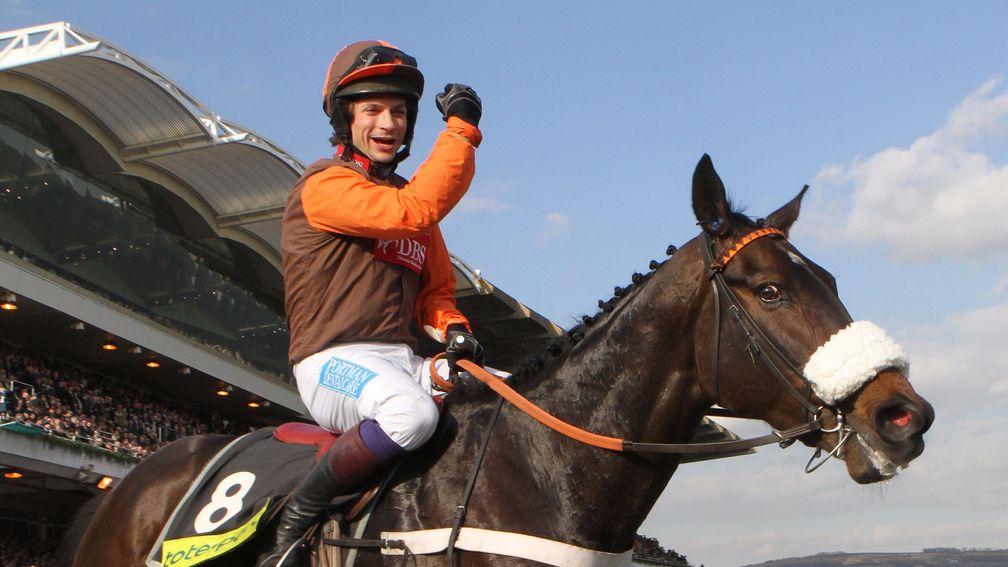
“One of my memories is jumping the water going back up the hill and not quite hitting a flat spot with him, but being all out. I gave him a slap and a kick trying to get him to move on, then jumped the open ditch with a huge long stride and was in the exact position I wanted to be.
“I remember looking to my outside and Denman was there, Kauto Star was on my inside and Imperial Commander was right there too. I was thinking ‘this is surreal!’
“I didn’t want to get to the front too early because he was a horse you wanted to keep coming up before giving him the space to let go as you knew he’d have a bit extra to get his head in front. He made a bit of a mistake at the top of the hill, but he jumped the last three so well.
“I remember coming round the bend with Denman and Kauto Star in front of me and then we started to draw alongside. I’m thinking ‘wow, this is it’. We hit the second last on the best possible stride and then pinged the last. You don’t dare look around, you don’t dare stop. It’s probably only ten seconds from the last to the finishing post, but it’s the most unimaginably long ten seconds.”
And then came the explosion of relief and joy. A moment that only a select few professional jockeys can claim to have experienced was now being enjoyed by an amateur having only his seventh ride in the past year. The pinnacle had been reached.
“I felt really overwhelmed as we pulled up,” he says. “There had been so much pressure and expectation and you have to just bottle that up so it doesn’t interfere. I remember the roars of the crowd, people going wild, TV cameras being thrust in my face, it was all incredibly overwhelming.
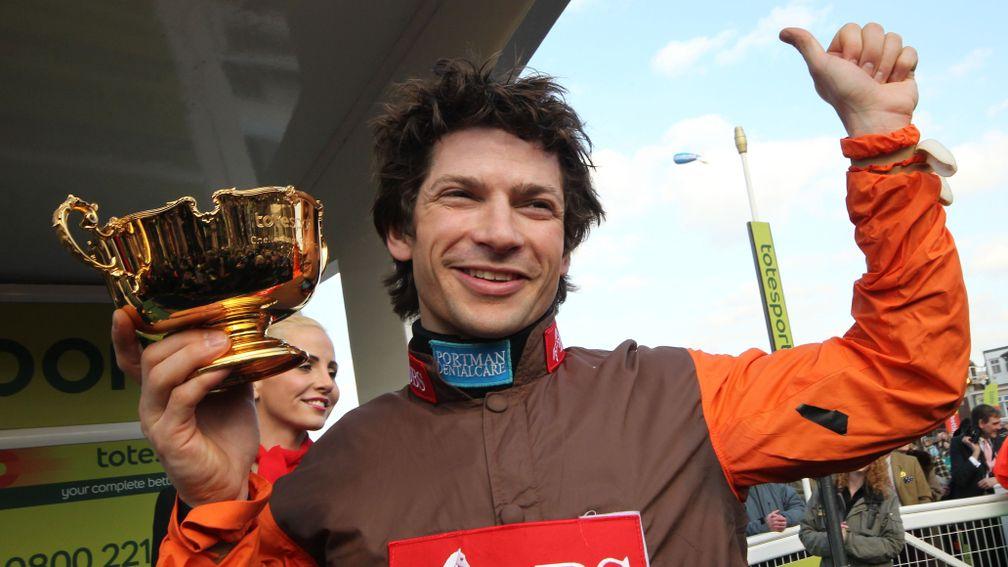
“I thought I was on the brink of bursting into tears. Then your mind clicks into action because your job isn’t done yet. You have to get the horse in and get weighed, so you pull back a bit. I remember clearly the surrealness of everybody celebrating and being surrounded by this sense of euphoria, but at the same time I had to operate on a different plane to everyone else. I was very conscious of that.
“It was probably an hour and a half after the race where I finally had that moment to catch my breath and appreciate where I was and what had happened.”
The celebrations were spectacular but, for the horse, such heroic performances can leave their scars on even the best of them, and Waley-Cohen is convinced we never again got to see Long Run at his peak.
“His absolute best was that Gold Cup-winning year, but like so many other horses it takes so much out of them. Not many horses reach that pinnacle again and I think that was probably true of Long Run, but he was an incredibly courageous horse who would always keep fighting for you.”
That was far from the end of Long Run, though. More fantastic days followed, most notably a second King George in 2012 when he showed tremendous tenacity to reel in Captain Chris in the final strides to land the spoils by a neck.
He was still good enough for placed finishes in the next two Gold Cups after his win, but as the 1s, 2s and 3s in his formline turned into 4s and 5s, the Waley-Cohens were faced with some difficult choices.
“The expectations are always so high for a horse who has touched the stars the way he did,” says Waley-Cohen. “Once they start to not quite reach that level it can be a very difficult transition. That next year in 2013-14 we were really wondering how to get the best out of him again while still looking after him.”
A crack at the 2014 Grand National failed to pay dividends when Long Run, never one to respect his fences, crashed out at Valentine’s on the first circuit and a disastrous trip back to where it all began for him at Auteuil shortly after all but spelled the end.
An injury picked up while travelling to France took him out of action for the best part of two years and. although he returned for a swansong in a hunter chase at Carlisle in 2016, the time had arrived for Long Run to move on to the next chapter of his life.
“He’d had a really bad preparation for that race at Auteuil. He had a horrid trip over and we really regret running him in that race,” Waley-Cohen reflects.
“He’d been racing for a long time and we thought we’d just muck around with him at home. He’d really had his best days by then and we ran him once and thought, ‘no that’s enough. We’ll take him home and let him retire gracefully and teach the youngsters what it means to be a racehorse.’”
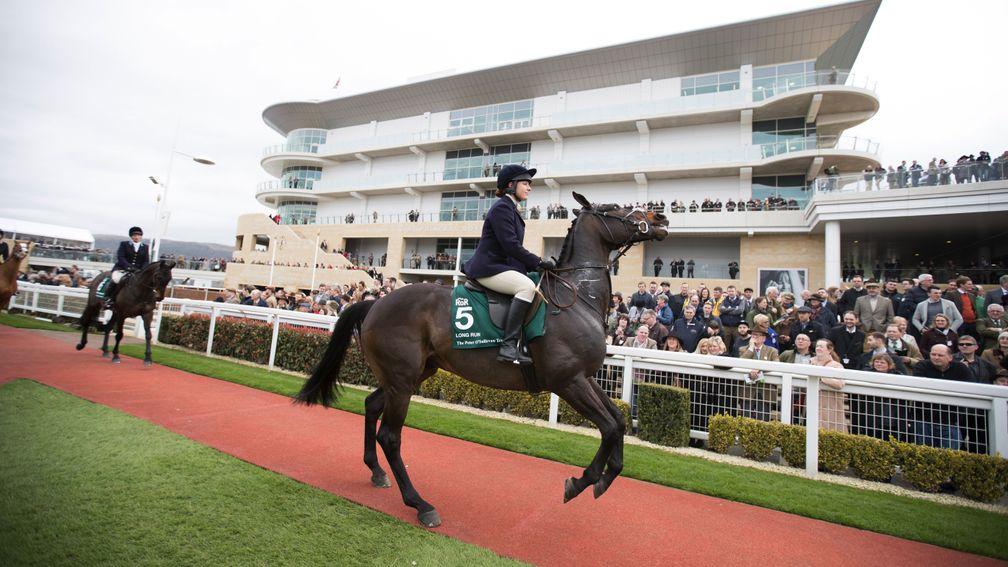
What will be remembered as a remarkable career had come to a rather unremarkable conclusion, but five years later Long Run remains the apple of the Waley-Cohen family’s eye.
“He was and is part of the family,” his former rider says. “He made a huge impact on our lives and we wanted to be sure we looked after him. He’s still here at home, he still gets ridden every day, leading the ponies out, and he’s very much still part of the set-up.
“He really set a totally different set of expectations around our horses. A great horse brings you all together, everyone enjoys it and brings pleasure from it. He was the glue that did all that.”
Fans' Favourites is a feature in the Racing Post Weekender in which we talk to those closest to racing's most popular horses and find out why they pluck on our heartstrings. Out every Wednesday
More from this series
Reve De Sivola: the Long Walk king with the heart of a lion
Politologue: Hales on why the Tingle Creek king is the best jumper he's owned
Yorkhill: the efforts to revitalise an enigma wrapped in a mystery
Simply Ned: the public's outsider, a flamboyant, attractive, tremendous jumper
Prince Of Arran: 'horse of a lifetime' who never disappoints at Flemington
Roaring Lion: the dazzling champion with the courage to match his speed
Sea The Stars: a horse of a lifetime who enjoyed the most perfect of seasons
Battaash: the speed machine who is the pride and joy of trainer and groom
Overturn: from Plates to Cups to Champion Hurdles; a true warrior on all fronts
The Weekender is out every Wednesday and is available at all good stores. You can also download the edition from 9pm on Tuesday evening
Published on inFeatures
Last updated
- Captain Marvel: how a modern master of Cheltenham and a genuine pioneer executed one of the shocks of the year
- 'We’re delighted with how it's going' - joint-trainers prepare for exciting year after Flat string is doubled
- 'We’ve had to work hard this sales season' - Kennet Valley seeking to build on success with biggest string
- Alastair Down's archives: the great writer recalls Coneygree's glorious victory in the 2015 Cheltenham Gold Cup
- Kauto Star: the extraordinary talent who became the benchmark for sheer undiluted quality
- Captain Marvel: how a modern master of Cheltenham and a genuine pioneer executed one of the shocks of the year
- 'We’re delighted with how it's going' - joint-trainers prepare for exciting year after Flat string is doubled
- 'We’ve had to work hard this sales season' - Kennet Valley seeking to build on success with biggest string
- Alastair Down's archives: the great writer recalls Coneygree's glorious victory in the 2015 Cheltenham Gold Cup
- Kauto Star: the extraordinary talent who became the benchmark for sheer undiluted quality